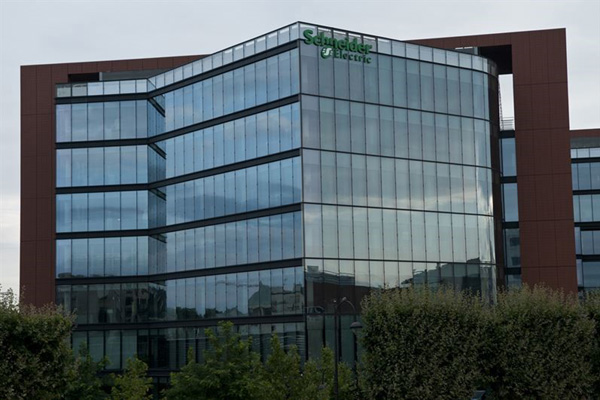Schneider Electric, a leader in digital transformation of energy management and automation, is developing a new “End to End Traceability” tool to monitor products across the entire supply chain, both upstream and downstream of manufacturing plants.
End-to-end product traceability has become a major challenge for food and beverage companies aiming to meet growing stakeholder demand. Schneider Electric is combining its knowledge of the food and beverage segment with the expertise of Microsoft, its partner, in blockchain technologies, said a statement from the company.
Faced with increasingly complex supply chains, stricter regulation and more demanding consumers, food and beverage manufacturers are making a priority of product traceability. The stakes are high, involving brand reputation, regulatory compliance, competitive advantage and costs, it said.
An Allianz Global Corporate and Specialty report published in late 2017 estimates that insurance claims for a product recall reach an average of $9.5 million, with the food and beverage industry being the second most impacted, just after the car industry. Food and beverage product traceability can be complicated to set up, given the number of stakeholders involved across the supply chain (producers, suppliers, manufacturers, distributors, and transporters), it added.
At its recent Innovation Summit, hosting more than 5,000 experts, customers and partners from all over the world at Paris Expo Porte de Versailles, in France, Schneider Electric presented during its Schneider World Premiere the latest innovations in its EcoStruxure IoT-enabled, plug and play, open, interoperable, architecture and platform.
EcoStruxure delivers enhanced value around safety, reliability, efficiency, sustainability, and connectivity. It leverages advancements in IoT, mobility, sensing, cloud, analytics and cybersecurity to deliver Innovation at every level, from connected products, edge control to apps, analytics and services. It has been deployed in 480,000+ installations, with the support of 20,000+ system integrators, connecting over 1.5 million assets.
On this occasion, Schneider Electric unveiled a proof of concept for its new “End to End Traceability” application, as part of EcoStruxure for Industry. Benjamin Jude, food and beverage segment solution architect at Schneider Electric, said “this ‘End-to-End’ traceability facilitates much faster product recalls.”
Building on its expertise in the Food and Beverage segment, with 21 of the Global Top 25 major Food and Beverage companies among its customers, Schneider Electric has worked with a major fresh produce retail group, a distributor and a transporter to develop a prototype for the downstream part of ‘End-to-End Traceability’.
Jude added: “With this prototype, these companies can build an electronic passport for each product to fully automate the contracts between them. For example, leveraging IoT, they can maintain an unbroken cold chain.”
“In addition to ensuring full product traceability, ‘End-to-End Traceability’ will also offer time savings by warning the distributor in real time of any delays in delivery or production.
Combining Schneider Electric’s industrial know-how with Microsoft’s blockchain expertise
“End to End Traceability” incorporates cutting-edge Schneider Electric technologies, including shock/humidity Telemecanique Sensors and a “click-to-cloud” system for reporting secure information from connected objects and sensors. To manage efficiently the information from these different sources, Schneider Electric has drawn on its partner Microsoft’s Azure cloud platform and knowledge of blockchain technology.
Thomas Conté, cloud engineer and blockchain evangelist at Microsoft, said: “Blockchain is a digital technology that allows all members of an ecosystem to automatically share a common and unique truth on all their interactions.”
“That truth is fully transparent to all of them, and all of them contribute to generating and storing that truth. It generates trust between those members,” he said.
Microsoft partnered with Schneider Electric to select the most suitable blockchain technology and to build very quickly the PoC using Azure Blockchain as a service. Conté continued: “The smart contracts leverage the truth shared by all stakeholders to automatically execute tasks like payments or products recalls, and improve collaboration between all of them.”
They will automatically execute the service terms and conditions agreed by the different stakeholders (delivery times, temperature/humidity/shock levels, etc.). Each telemetric reading is archived securely in the blockchain and shared between all members to ensure traceability. Lastly, the blockchain protocol used (Ethereum) and the targeted governance (consortium blockchain) ensure to develop a project with very low energy-consumption.
Schneider Electric, Microsoft, and their partners intend to pursue this proof of concept over the next few months before the solution is launched on the market, it stated. – TradeArabia News Service
Industry, Logistics & Shipping
Schneider developing new end to end traceability tool

- Similar Stories

EWEC announces partners for 1.5 GW solar project

Inaugural future mobility event DRIFTx kicks off in Abu Dhabi

Abu Dhabi plans to deploy sea gliders with Regent

Maalexi signs deal with ECI to help agri-trade SMEs

AIM Congress Abu Dhabi to host over 300 startups

DMCC roadshow in Japan aims at driving Dubai growth in AI, gaming

Al Ghurair, Mitsubishi Chemical Infratec open Alpolic facility in RAK

Vertiv announces new Middle East HQ in Riyadh

UAE, Kenya sign MoU to develop mining, technology sectors

Metrology role in boosting industrial capabilities discussed

Bobcat debuts electric telehandler concept at Intermat

10,000 immediate job interviews done for Emirati talents

ESA picked 2024 Steel Sustainability Champion by worldsteel

Bayanat, Yahsat shareholders to vote on merger on April 25

Al Ojaimi Industrial launches JV with REPL in Riyadh

UAE-Oman railway project will help cut carbon emissions

Saudi industrial zone sees big jump in local food companies

$3bn UAE-Oman rail project enters implementation phase

Hitachi plans $1.5bn investment to boost transformer production

Alba achieves milestone at PS5 with Mitsubishi's turbine First Fire

Krohne fuels industrial decarbonisation with top solutions

AD Ports locks 20-year deal to operate, upgrade Luanda Port

UAE, Oman enter $35bn investment deals

Al Yamamah starts production at expanded Jeddah pipes factory

Schneider appoints El Jarroudi VP for Industrial Automation

Dubai World Trade Centre cluster names new finance head

Bosch banking on innovations, tie-ups and acquisitions

Ariston Middle East highlights sustainable solutions in UAE

National Forum for SMEs - Government Procurement Tuesday

Aramco in talks to buy 10% stake in China's Hengli Petrochemical
